Battling stigma and distrust, male pre-school teachers find joy in shaping young minds
With men making up fewer than 1 per cent of pre-school educators in Singapore, those in the sector may need to work extra hard to prove themselves and gain acceptance.
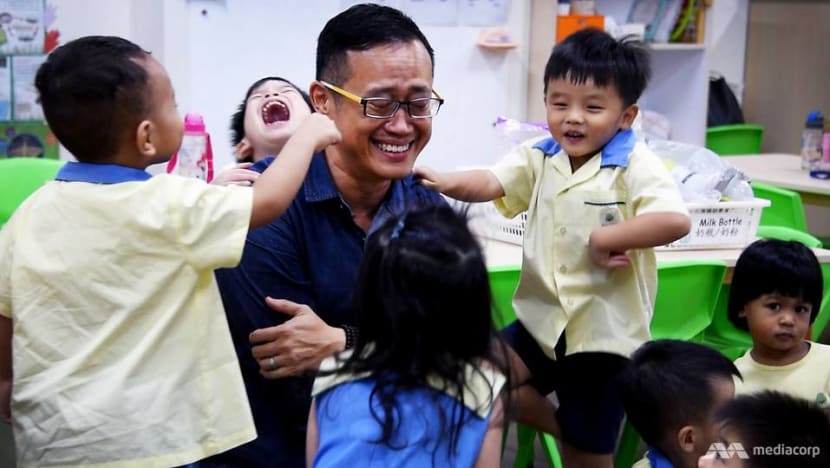
SINGAPORE: At the age of 44, Lorbert Tay is well built and athletic, with photos in his office displaying his achievements in international triathlons.
So it is hard to imagine him as a pre-school teacher.
But for every photo of him competing in a triathlon or posing with a medal, there are others which showcase his love for children and passion for shaping young minds.
In one, he is taking a group of children on a hike, all of them clad in multicoloured ponchos. In another, he is in a supermarket, holding a fish and letting the children touch it.
It is clear that he is in his element when he is with the children. And likewise for them.
Screams of “Teacher Lorbert!” fill the air as he makes his rounds in the pre-school. They run to him with brightened faces, some of them try to clamber onto his back while others reach for him, looking for a hug.
WATCH: Meet the male pre-school teacher (7:05)
A boy pulls a face at him. Tay grins and reciprocates, earning a giggle. Some children, he says later, even call him ‘Papa’ or ‘Daddy’.
Tay, a centre manager at pre-school chain Carpe Diem, is one of about 150 male pre-school educators in Singapore. They make up fewer than 1 per cent of the total pool of early childhood educators.
READ: Why it's still so hard to have more early childhood educators in Singapore
HALF THE CLASS WANTED TO WITHDRAW
As a man in a female-dominated environment and working with young children on a daily basis, Tay is well aware that his presence can raise parents’ suspicions.
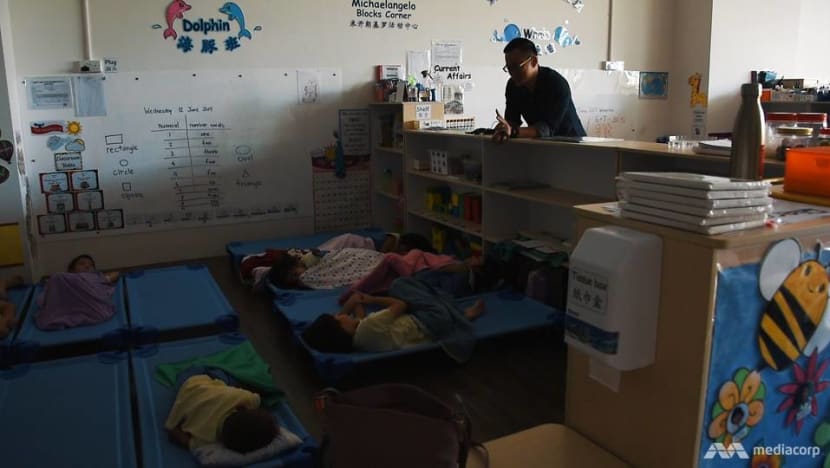
He remembers the first time he took a class on his own. It was 2010, and he was working for PAP Community Foundation (PCF) Sparkletots, Singapore’s largest pre-school operator.
“A lot of parents were very skeptical … What’s this guy doing here?” he says. “Their imagination went wild, and they thought I was some kind of weirdo or sicko, coming into the industry and trying to be a predator.
The following day, I heard from my principal … Half the class wanted to withdraw.
It was a sad moment for him. But he also remembers his principal encouraging him not to give up, and convincing the parents to give him a chance.
His first year in the industry was the toughest. “Parents were worried, so every small thing … even if it was a scratch or mosquito bite, was my fault,” he recounts. “I had to explain what my intentions were, from the start to the end, and build trust with them.”
He made an effort to think of novel ways to engage the children and help them learn.
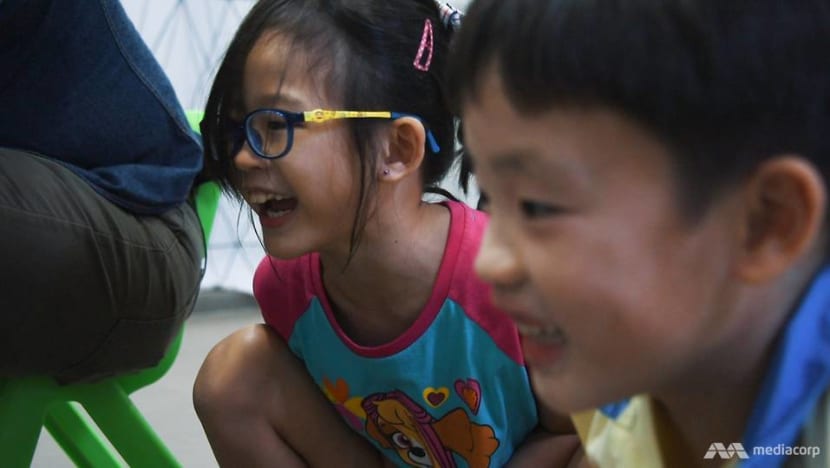
“There were sleepless nights,” he says. “I felt as if I needed to work extra hard to prove myself, so I dug up all the different YouTube videos to look for interesting things that I didn’t really see other teachers doing.
“For the rest of the year, I had a lot of fun with the children, so much so that they didn’t want to end the day. By the end of the year, even the parents in the other classes wanted to ask for a transfer to my class.”
ALLAYING PARENTS’ CONCERNS
Today, Tay is careful to ensure that nothing he does can be misconstrued by a parent.
As a male educator, he does not do routine care, such as showering the children or changing their diapers. He also has several unspoken rules, for example not entering the children’s bathroom unless necessary, so that he does not see a child in a state of undress.
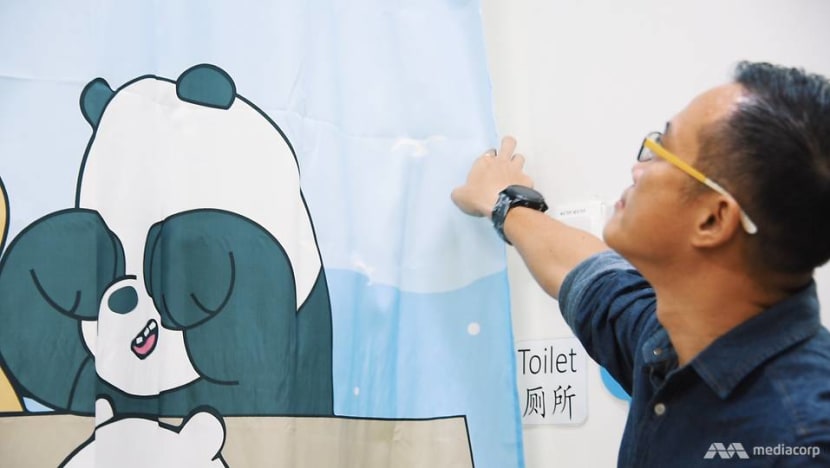
He also limits his physical contact with the children, and over the years has developed guidelines for himself and any male teacher who might join the centre. For example, he uses only one arm to hug the children — and that hug is limited to a pat on the back.
When he first joined the sector, he did not have specific guidelines setting out what he could or could not do as a male educator. He decided to develop his own to not only protect the children, but also himself.
“I was very stressed,” he says. “I had to watch over my back to make sure that I didn’t do things that parents would feel awkward or upset about.”
He remembers once, early in his career, when he forgot himself and gave a child a full-on hug. “When I turned around, the parent was staring at me like a hawk,” he recalls. “That’s when I realised … oh no, I made the mistake I told myself not to do.”
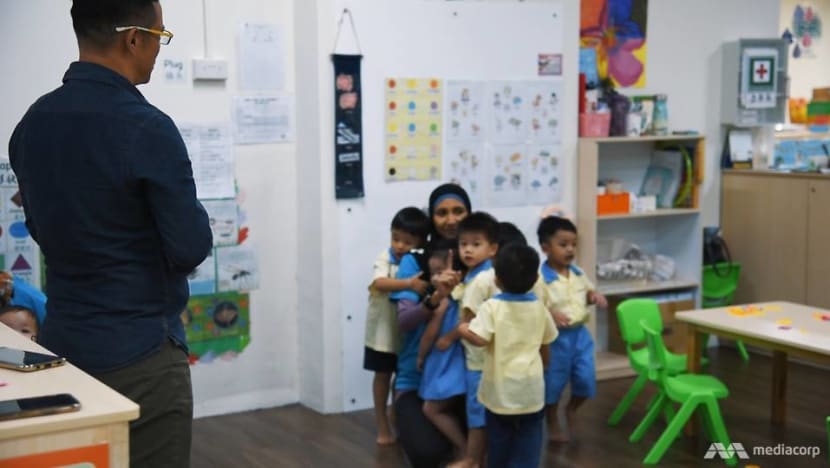
To parents such as Elise Cheng, whose younger daughter attends Tay’s centre, it is clear that he makes the effort to minimise contact when he is with the children.
“With two girls, I’ll always have this fear of physical contact,” she says. “We’ll always be worried about paedophiles or predators … especially when you read the news about people waiting outside schools to prey on girls.
“But over time, when I saw (Tay) work, my trust increased, and now I’m very comfortable with him being with my two girls.”
Adhering to his guidelines can be challenging, and even saddening at times, but he knows there are lines he cannot cross. “As much as I want to pour my love out to them, I have to control myself,” he says.

HIRED ON THE SPOT
Amid these challenges Tay has faced, he persevered because he had always known he wanted to teach.
Following graduation with an information technology degree, even as he tried out different jobs — from IT to operations to sales — he would without fail apply to join the Ministry of Education (MOE) as a primary school teacher.
“My friends believed I had a gift for touching the hearts of children,” he says. “They noticed that even their children who didn’t socialise well with strangers would simply enjoy my company, even when they saw me for the first time.”
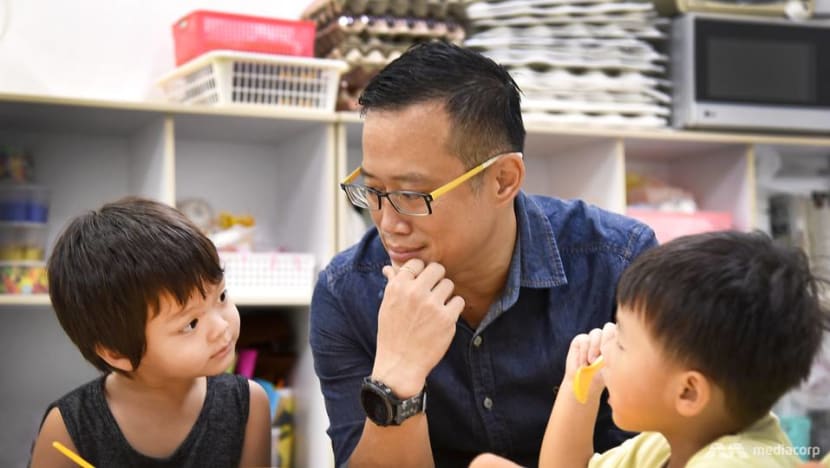
For 10 years, there was no response from the MOE. But the chance to live out his dream arrived in 2009, when he came across a PCF booth at a job fair.
“There was this man standing there who asked me if I was interested in becoming a pre-school teacher,” he recounts. “I told him I wanted to … shape (children’s) characters, and the best time to do it is when they’re young.”
The two continued talking. And suddenly, the man told him: “You’re hired.”
“I hadn’t even brought my certificates or anything, and I didn’t even apply for the job proper,” Tay says, chuckling. He later found out that the man he had met was the PCF head.
“The funny thing was, after I accepted the job, MOE called me back,” he adds.
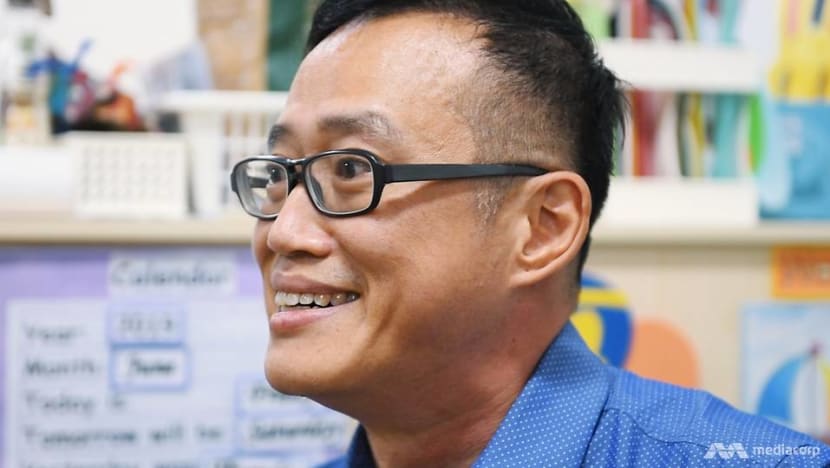
He joined Sparkletots in 2010, juggling his work at the centre with his diploma studies in early childhood education. Despite the 50 per cent pay cut he had taken, the hard work and the challenges along the way, he was happy.
Tay worked his way up, joining various operators before taking on a more administrative role at Carpe Diem, making sure his centre runs smoothly.
He still enjoys the time he has with the children, and makes a point of greeting them by name every morning.
“They appreciate these small gestures … and they’d feel happy and proud,” he explains. “I noticed that if they’re happy when they come in, they’d be happy throughout the day.”
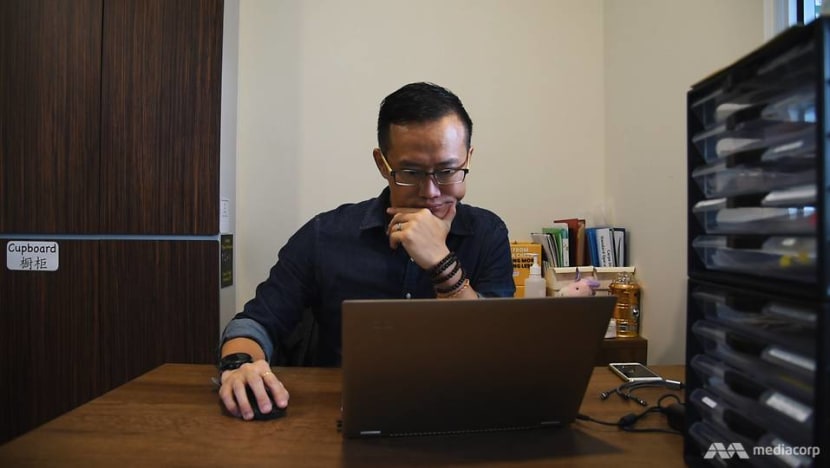
NOT THEIR FIRST CHOICE
Male pre-school teachers are valued, according to the Early Childhood Development Agency (ECDA), as they can “help to bring different strengths and perspectives to the sector”.
But the proportion of male educators in the sector has remained below 1 per cent for the past three years.
“Some pre-school educators have shared that there may be a perception that the pre-school sector is more suited to women, and this may deter men from joining,” the ECDA said in an email response to CNA Insider.
WATCH: It's tough being a pre-school teacher (4:03)
Muhammad Hadi Kamal realised he was a “rose among the thorns” when he entered Temasek Polytechnic in 2010 to do his early childhood diploma course: Of the 60-odd students in the cohort, five were male.
And for three of the five, the course was not their first choice, which had been psychology. “In early childhood, there are overlaps with psychology,” explains Hadi, 25 and now a teacher at NTUC First Campus – My First Skool.
While he had always wanted to join the sector since he was a teenager, another teacher, 23-year-old Darius Ng, admits that he ended up in early childhood because his O-Level results did not make the cut for psychology. But he has, he said, since fallen in love with the job.
At school, they were “the centre of attention”, but Hadi shares how different it was after graduation: While pre-schools were inviting his female batchmates for centre tours or interviews, eight out of 10 times he received no response to his job applications.
One centre told him it “doesn’t accept male teachers at all”, he recalls. “I was taken aback.”
But today, Hadi is confident that the situation has improved. “The mindset has changed,” he says. “A lot of centres are taking in male teachers, especially those who are making a mid-career switch.”
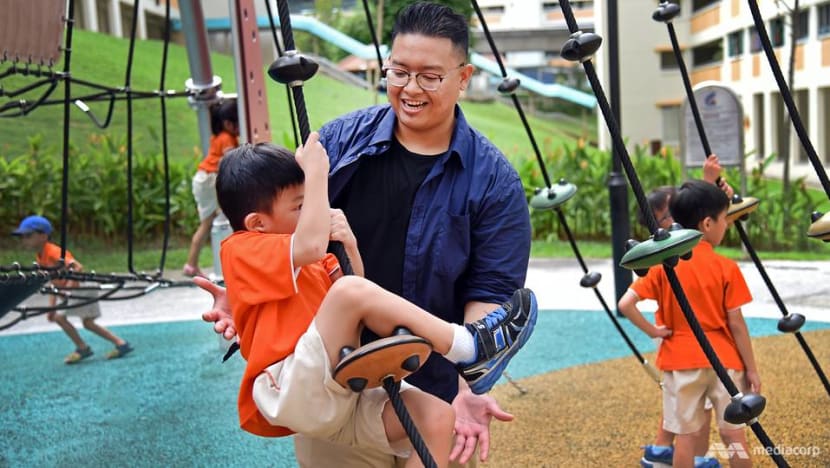
According to the ECDA, the proportion of full-time male students enrolled in the pre-employment training diploma courses has doubled from about 4 per cent in 2014 to 8 per cent in 2017, and remained stable last year.
PCF Sparkletots and NTUC First Campus — both government-appointed anchor operators — said male educators are welcome in their centres.
“The feedback from parents and fellow educators at PCF Sparkletots has been positive so far, as the presence of male pre-school educators contribute to gender balance in the classroom and enable children to be exposed to positive male role models,” stated the PCF.
As for guidelines, the ECDA said the Early Childhood Development Centres Regulations do not prescribe duties that male educators should or should not perform. Pre-schools may, however, develop their own guidelines on the duties of different groups of staff.
Gender-specific dos and don’ts were made clear to both Hadi and Ng at their respective centres. And while the latter stresses the importance of building trust with parents, he does not recall any negative experiences.
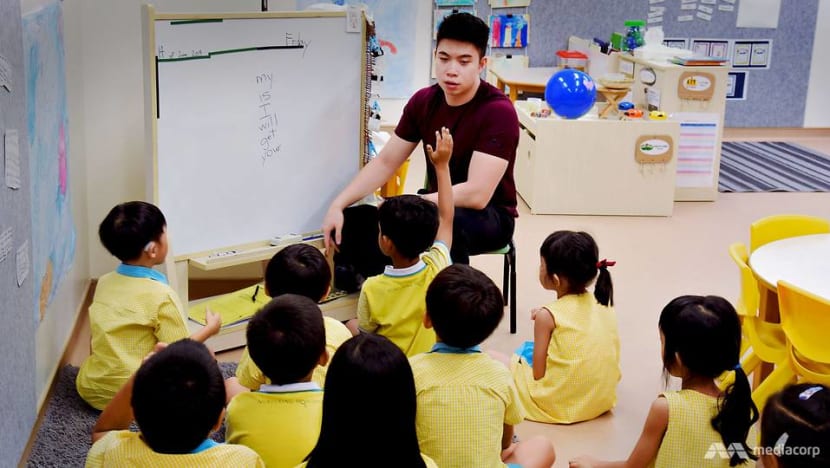
“There was one parent of twin girls who asked my principal if I’d be bringing her daughters to the toilet. But I think she just needed the assurance that I wouldn’t be doing routine care,” he says.
"Most parents just approach me with a smile and tell me that I’m rare."
MAKING A DIFFERENCE
Over at Carpe Diem, where it is mealtime — with the clatter of spoons and clamour of children eating their pumpkin cake — Tay is in the thick of the action, seated on one of the child-sized chairs and helping the teachers spoon food into the children’s mouths.
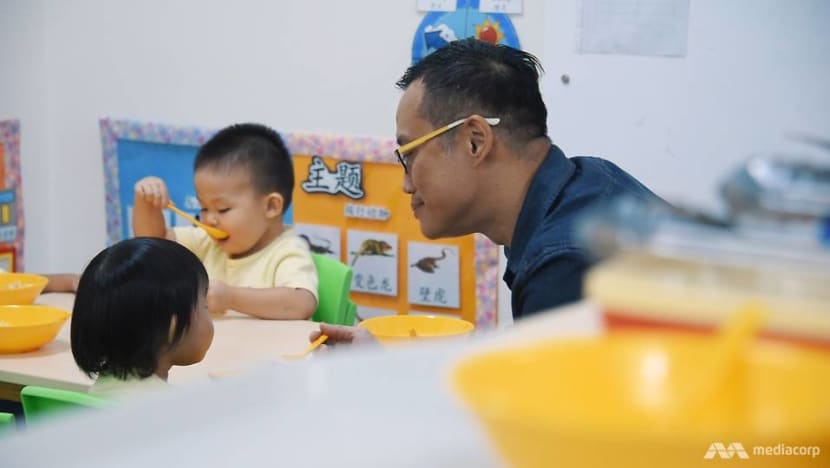
“I usually come over to de-stress,” he says as he cajoles a child to open her mouth. “Feeding the young ones is actually very therapeutic.”
“Papa!” squeaks a child from across the table.
“Someone has called me,” he says with a wistful smile. “The whole class … they’re all my children.”
It is a sad irony for him because instilling values and shaping the lives of the children in his care is the closest he can come to being a father: He is unable to have children of his own.
Tay explains that after a few years of trying for a child, he and his wife found out that she had developed a cancer in her womb. In 2014, the couple made the decision to remove the womb to stop the cancer from spreading.
His wife broke down when she heard the news, he recounts. He himself was sad, but kept his emotions in check because he did not want to upset her further.
“She knew how much I wanted to have my own children, but I had to show her that it was okay,” he says. “Her health is more important.”
Tay has made his peace with that, and says he is content with the role he plays in the lives of the children he works with every day,
“(My time with them) starts at 18 months, till they’re six years old. That’s a very long time,” he says. “So from seeing them grow from crying babies to mature boys and girls ready for primary school … that’s the biggest satisfaction I get.”
Because he knows he makes a difference in their lives.














